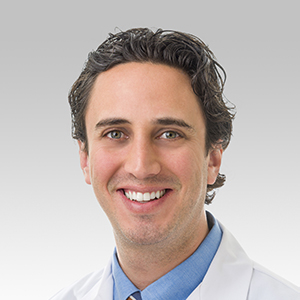Immunotherapy for Glioblastoma with Adam Sonabend, MD
Immunotherapy has revolutionized cancer treatment over the last few decades, though not for glioblastoma — the most common and deadly malignant brain tumor. However, Northwestern Medicine neurosurgeon Adam Sonabend, MD, shares promising research on the potential benefits of immunotherapy for certain glioblastoma patients.

"What we found is that the patients that got immunotherapy and had this biomarker elevated live significantly longer than the patients that did not have the biomarker elevated and also got immunotherapy, and also had significantly longer survival than patients that didn't get immunotherapy."
- Associate Professor of Neurological Surgery
- Member of Robert H. Lurie Comprehensive Cancer Center
- Member of Simpson Querrey Institute for Epigenetics
Episode Notes
Northwestern Medicine scientists have discovered a new biomarker to identify which patients with glioblastomas may benefit from immunotherapy. The prognosis for glioblastoma is, on average, only a little over a year. Study author Adam Sonabend, MD, details how this discovery could prolong the lives of an estimated 20 to 30 percent of glioblastoma patients, in addition to other developments in the field.
Topics covered:
- Sonabend's NIH-funded lab has a twofold focus to target glioblastoma: crossing the blood-brain barrier – a membrane that keeps the brain from being exposed to toxicity as well as most drugs – and personalizing treatment. "No two tumors are necessarily equal with regards to how they will respond to a given therapy," he says.
- Sonabend explains that the most widely adopted immunotherapy is immune checkpoint blockade. This type of immunotherapy prevents tumor cells from activating a break in T-cells, or lymphocytes, so they can attack the tumor.
- Glioblastomas are elusive targets for immune checkpoint blockade, among other treatments, because of their paucity of T-cells and characteristics that distinguish them from the rest of the body.
- In the recent Nature Cancer study, Sonabend's team examined tumors following PD-1 immune checkpoint blockade and learned those with elevated levels of a biomarker predicted survival of recurrent glioblastoma. The team then found the same correlation in samples from a separate cohort of patients from a different trial.
- The next steps for the study are to understand the mechanisms behind the results and, since the data is retrospective, to validate the findings in a clinical trial.
- Sonabend is also hopeful about his lab's research using ultrasound-based technology to open the blood-brain barrier for short periods of time, thus enabling drugs to pass through.
Additional Reading & Resources:
- "ERK1/2 phosphorylation predicts survival following anti-PD-1 immunotherapy in recurrent glioblastoma" in Nature Cancer
- "TOP2B Enzymatic Activity on Promoters and Introns Modulates Multiple Oncogenes in Human Gliomas" in Clinical Cancer Research
- Previous episode about a new therapy for glioblastoma: Northwestern Drug Kills Glioblastoma Tumor Cells with Priya Kumthekar, MD
Subscribe to Feinberg School of Medicine podcasts here:
Recorded on Dec. 13, 2021.
Continuing Medical Education Credit
Physicians who listen to this podcast may claim continuing medical education credit after listening to an episode of this program.
Target Audience
Academic/Research, Multiple specialties
Learning Objectives
At the conclusion of this activity, participants will be able to:
- Identify the research interests and initiatives of Feinberg faculty.
- Discuss new updates in clinical and translational research.
Accreditation Statement
The Northwestern University Feinberg School of Medicine is accredited by the Accreditation Council for Continuing Medical Education (ACCME) to provide continuing medical education for physicians.
Credit Designation Statement
The Northwestern University Feinberg School of Medicine designates this Enduring Material for a maximum of 0.25 AMA PRA Category 1 Credit(s)™. Physicians should claim only the credit commensurate with the extent of their participation in the activity.
Disclosure Statement
Adam Sonabend, MD, has patented technology at Northwestern University and Columbia University. Lukas Rimas, MD, peer reviewer, disclosed external professional relationships with Medlink Neurology, the American Physician Institute and EBSCO (honoraria); Bristol-Myers Squibb (research support); and Novocure (speaker's bureau and advisory board). Course director, Robert Rosa, MD, has nothing to disclose. Planning committee members, Erin Spain and Amanda Dee, have nothing to disclose. Feinberg School of Medicine's CME Leadership and Staff have nothing to disclose: Clara J. Schroedl, MD, Medical Director of CME, Sheryl Corey, Manager of CME, Allison McCollum, Senior Program Coordinator, Katie Daley, Senior Program Coordinator, and Rhea Alexis Banks, Administrative Assistant 2.
